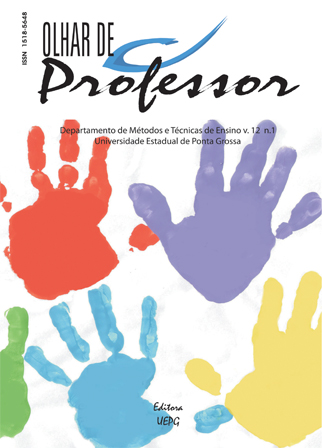PROJETO AMIGOS DA ESCOLA: UMA COMPLEXA PARCERIA PÚBLICO-PRIVADA - Doi: http://dx.doi.org/10.5212/OlharProfr.v.12i1.011032
Conteúdo do artigo principal
Resumo
Este artigo objetiva compreender o processo
de desenho, implantação e operacionalização do Projeto
Amigos da Escola – Todos pela Educação, criado pela
maior emissora de televisão brasileira, a Rede Globo de
Televisão, que há dez anos (1999-2009) transmite em
nível nacional propagandas televisivas direcionadas ao
estímulo da atuação do voluntariado na escola. A partir
da análise de conteúdo de documentos, artigos e pesquisas
acadêmicas e de entrevistas com importantes atores
participantes do projeto, o autor objetiva identificar as
fragilidades existentes no seu desenho, operacionalização
e execução em tela, bem como compreender as
interfaces que se estabelecem entre os diversos atores
que interagem neste tipo de projeto. O estudo da forma
de estruturação processual deste tipo de iniciativa
privada ganha relevância diante da predominância das
parcerias público-privadas, enquanto técnica gerencial
predominante nas ações governamentais nas três esferas
de governo – municipal, estadual e federal.
Downloads
Detalhes do artigo
Autores que publicam nesta revista concordam com os seguintes termos:
a) Os autores mantêm os direitos autorais e concedem à revista o direito de primeira publicação, com o trabalho simultaneamente licenciado sob a Creative Commons Attribution License Atribuição 4.0 Internacional (CC BY 4.0) que permite o compartilhamento do trabalho com reconhecimento da sua autoria e publicação inicial nesta revista.
b) Os autores são autorizados a assinarem contratos adicionais, separadamente, para distribuição não exclusiva da versão publicada nesta revista (por exemplo, em repositórios institucionais ou capítulos de livros), com reconhecimento da sua autoria e publicação inicial nesta revista).
c) Os autores são estimulados a publicar e distribuir a versão onlline do artigo (por exemplo, em repositórios institucionais ou em sua página pessoal), considerando que isso pode gerar alterações produtivas, bem como aumentar o impacto e as citações do artigo publicado.
d) Esta revista proporciona acesso público a todo o seu conteúdo, uma vez que isso permite uma maior visibilidade e alcance dos artigos e resenhas publicados. Para maiores informações sobre esta abordagem, visite Public Knowledge Project, projeto que desenvolveu este sistema para melhorar a qualidade acadêmica e pública da pesquisa, distribuindo o OJS assim como outros softwares de apoio ao sistema de publicação de acesso público a fontes acadêmicas.
e) Os nomes e endereços de e-mail neste site serão usados exclusivamente para os propósitos da revista, não estando disponíveis para outros fins.
______________

Este obra está licenciado com uma Licença Creative Commons Atribuição 4.0 Internacional.





